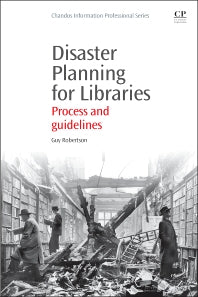Freshly Printed - allow 10 days lead
Couldn't load pickup availability
Disaster Planning for Libraries
Process and Guidelines
A comprehensive but concise guide to disaster planning for any kind of library, including academic, public, corporate/special, and domestic.
Guy Robertson (Author)
9781843347309, Elsevier Science
Paperback / softback, published 15 December 2014
232 pages
22.9 x 15.1 x 1.6 cm, 0.3 kg
"...a practical guide to developing a comprehensive disaster plan for any library...an essential read for the library administrators managing significant library infrastructure." --Annals of Library and Information Studies
"Its strength is in risk identification and includes inventories of possible threats including toxic spills, train derailments, and nuclear power plant failures." --The Scholarly Kitchen
Libraries are constantly at risk. Every day, many libraries and their collections are damaged by fire, flooding, high winds, power outages, and criminal behaviour. Every library needs a plan to protect its staff, sites and collections, including yours. Disaster Planning for Libraries provides a practical guide to developing a comprehensive plan for any library. Twelve chapters cover essential areas of plan development; these include an overview of the risks faced by libraries, disaster preparedness and responding to disasters, resuming operations after a disaster and assessing damage, declaring disaster and managing a crisis, cleaning up and management after a disaster and normalizing relations, staff training, testing disaster plans, and the in-house planning champion.
Libraries and Risk
Disaster preparedness
Operational resumption, continuity, and recovery
Damage assessment and strategic alliances
Disaster declaration and crisis management
Clean-up, who, when and how
Post-disaster management of patrons
Normalization of operations
Staff orientation and training
Testing, auditing, updating disaster plans
The in-house planning champion
Pandemic management in libraries
Moisture control vendors and their services
Library security and loss control.
Subject Areas: Natural disasters [RNR], Social impact of disasters [JFFC], Library, archive & information management [GLC], Library & information sciences [GL]


